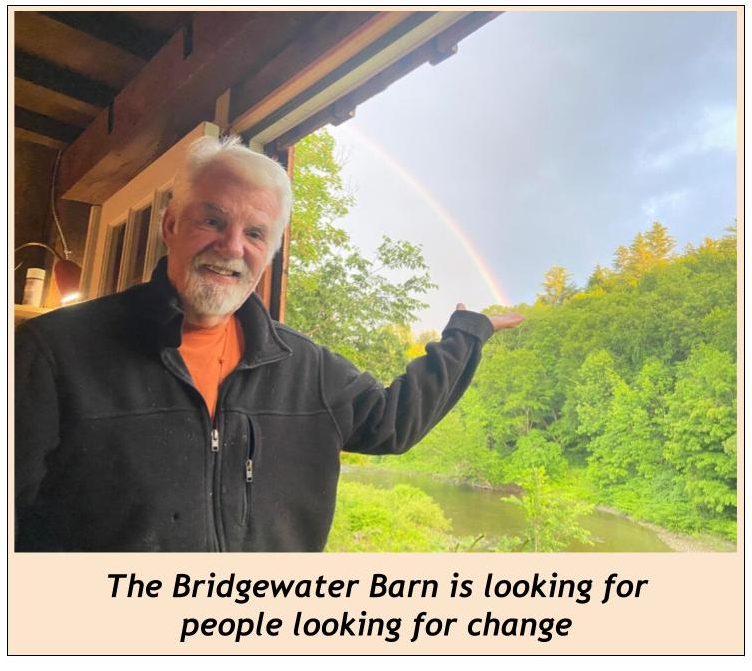
by Stephen Gorman
A new bill, S.236, is under consideration by the Senate Finance committee. This bill will make it more difficult for the public – including adjoining landowners – to object to new industrial-scale renewable energy projects.
As a lifelong environmental advocate, I oppose this legislation on many grounds, not least of which is the fact that it disenfranchises ordinary Vermonters trying to protect the environment from industrial development. It is the very definition of tyrannical, top-down government limiting the rights of citizens.
Consider this: Planet Earth is a green and blue island in space threatened by rampant ecological destruction; growing geopolitical conflict over diminishing resources and habitable land; looming energy, mineral, and food shortages; and millions of ecological and geopolitical refugees. Yet here in Vermont, we ignore the systemic nature of our planetary predicament. Instead, we concentrate on how to power a comfortable status quo with supposedly less carbon-intensive technologies.
Focusing solely on carbon emissions is simplistic, mechanistic, and reductionist. By myopically focusing on carbon, we ignore the fact that climate change is just one of the many symptoms of planetary overshoot. Other symptoms include biodiversity loss, desertification, faltering ocean circulation, land and soil degradation, tropical deforestation, ocean acidification, collapsing fisheries, depleting aquifers, crop failures and food shortages, plastic and other chemical contamination of food chains, increasing cancer rates, mass migration, and pandemics.
Overshoot means that humanity is consuming replenishable resources faster than ecosystems can regenerate them, and is producing waste (including carbon emissions) in excess of the ecosphere’s assimilative capacity. In short, humanity has already exceeded the carrying capacity of the earth. By overshooting planetary boundaries, we are depleting and contaminating the biophysical basis of our own existence.
Some argue that the “solution” is more of the same: we must deploy ever more technological “fixes” to prolong our dominance over the earth. This is magical thinking. We don’t need more technology; we need to live within ecological boundaries. It is now clear that a “business as usual but powered by other means” model (i.e., electrifying the Titanic) will lead rapidly to ecological and civilizational collapse. Icebergs have been spotted dead ahead. We need to change our course, not our power sources.
To see the results of our current strategy, just turn on the news on any given day. The full beauty and splendor of both the Biosphere and the Ethnosphere is being shredded before our eyes. I have spent my career documenting what’s left at this particular intersection, and I have seen the devastation that modern techno-industrial society, or the Technosphere, has brought to our last wild places and to the last cultures living in social solidarity with Nature.
It is an iron-hard fact that carbon emissions are correlated 1:1 with GDP and population growth. Our civilization has a built-in growth mandate, and our economy is optimized for profits. It is built upon the infinite consumption of finite resources and is powered by burning finite fossil fuels. That will not change if we don’t change course. World primary energy consumption in 2022 was 82% fossil fuels — the same as it was in 1972, the year that The Limits to Growth was published.
Increasingly, industrial solar and wind development are offered as the answer to our fixation on carbon emissions. But instead of replacing carbon-emitting fuels, these technologies merely add to capacity, thereby making every symptom of overshoot worse. We have made no progress by relying on technology and efficiency to reduce emissions in the last 50 years: carbon emissions have more than doubled since 1972.
“Renewable” technologies entail massive land destruction from mining, impose horrific environmental costs on local people and ecosystems, and are fossil fuel intensive at every step of their life cycles. From ore extraction, to smelting, to manufacturing, to transporting, to installation, they require massive quantities of fossil fuels. Despite record-breaking “alternative” energy installation world-wide last year, global carbon emissions reached all-time highs.
The energy provided by the sun and the wind is indeed renewable, but the industrial infrastructure required to capture it and turn it into useful power is not. And when the lifespan of “renewable” energy systems is over, they cannot rebuild themselves. They can’t power the extraction, processing, and delivery of the vast amounts of concrete, steel, copper, cobalt, lithium and a host of other rare and finite resources required for their manufacture, maintenance, and replacement.
Here in Vermont, building industrial renewables means destroying healthy ecosystems and tearing down the forests that are our life support systems, that define us, and that give us our sense of rootedness. Here in New England, we lose ± 30,000 acres of life-supporting, self-replicating, carbon-capturing forest each year to development, which increasingly includes industrial solar.
This destruction cannot continue. Rather than replace wild living trees with industrial dead solar panels, rather than surrender the Biosphere and the Ethnosphere to the Technosphere, we need to start saving every wild acre left, and begin rewilding wherever we can.
We must not seek to prolong our dominance over the planet’s ecosystem at all costs. Instead, we would be wise to alter our course. If we don’t, we will soon crash.
Author is an internationally renowned photographer with a focus on understanding how we depend on the ecosystems around us to sustain our material and spiritual lives, how we adapt to and modify the landscapes in which we live and work.
Categories: Commentary, Environment







An engaging and informative article.
Of particular interest: “It is an iron-hard fact that carbon emissions are correlated 1:1 with GDP and population growth.”
I agree 100% with that statement. Plotting a graph of population growth since 1800 and rising atmospheric CO2 levels since 1800 shows concordance.
Many have argued Paul Erhlich’s “Population Bomb” book that predicted worldwide famines was a colossal work of fiction. Well famines have occurred although not on the scale predicted in the book.
But, and of even greater importance, population growth has had an enormous negative impact on planetary health…as the author of the above Commentary details.
So here in Vermont where many people worship in the temple of growth, growth, growth…. the downside consequences to the growth called for may change the character of the State in ways that will cause many people to say: “how did this happen?”
any people living in vermont that have a growth problem please leave /// that will solve the growth problem///
I agree with this. Conservatives are the natural environmentalists because they actually like the outdoors. Modern leftists like the type that run Vermont promote policies like open borders and open drug use that ruin our environment. And we need to protect as much open land as possible. Conservatives should be on board with that.
I can agree that “we need to protect as much open land as possible,” but can we please leave the partisanship and labels behind? Enjoyment of the outdoors, the natural world, etc., is NOT a partisan issue, and “All Vermonters” (not members of one party or another) “should be on board with (conserving our natural landscapes and wild lands).”
It is unfortunate (IMO) that the Vermont Chronicle thinks of itself (correct me if I’m wrong) as being reflective only of politically conservative Vermonters (just because conservative think tanks fund them). Because Vermont’s more “mainstream” publications (like VT Digger) refuse to publish any commentary that might generate a different, or more varied narrative than their wealthy board members & donors prefer, people of varied political backgrounds have been publishing here, especially about environmental policy and topics that tend to bleed through into independent media (as opposed to corporate-funded mainstream outlets. I’m grateful that the Chronicle will do so; and would love for people in Vermont to set aside political labels and partisanship and stay focused on the issues where we can agree.
Thank you, Renee. Correction needed: We are not funded by any think tanks, conservative or otherwise. Apart from a small number of prominently displayed advertisers, we are funded solely by contributions from supportive Vermonters, most of whom as Sustaining Subscribers contribute $108/year. Reading VDC is free whether one is a Sustaining Subscriber or not.
Well said, my friend.
That we prefer ‘dead’ solutions to ‘living’ solutions says everything about who is in charge… ‘we know him by his works’…the idea being to capture everything we rely on to get from day to day and enslave us so that we comply with their AI-death dealing, population dessimating policies in health, energy, and environment.
The Hopi have a word for this: Koyanasqatsi, or world upside down.
We have been warned for thousands of years that our actions and choices would land us here if we didn’t get right with God…who gives life everlasting…and got His Son killed for suggesting such a thing…
We get what we accept.
Peace, love, and His will…the ONLY solution, as within those, LIFE happens…